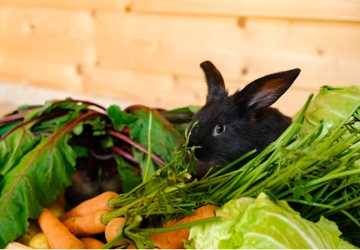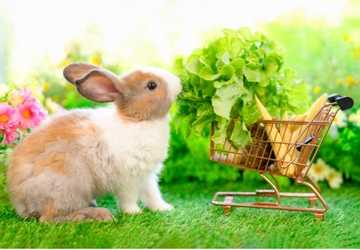How to Maintain a Healthy Diet for Your Rabbit
Ensuring a healthy diet for pet rabbits is indispensable for their overall well-being. This compendium will give you all the necessary erudition to keep your rabbit vigorous and content.
Understanding Rabbit Nutrition
What Constitutes a Healthy Diet for Pet Rabbits?
A healthy diet for pet rabbits primarily consists of fresh hay, verdant vegetables, measured pellets, and untainted water. Each constituent plays a pivotal role in sustaining your rabbit's vitality.
Significance of Hay
Hay is the cornerstone of any rabbit nutrition guide. It facilitates digestion and maintains their dentition in optimal condition. The finest varieties of hay for rabbits include:
- Timothy Hay
- Orchard Grass
- Meadow Hay
- Alfalfa Hay (suitable for juvenile rabbits)
Fresh Vegetables

Fresh vegetables are indispensable in a healthy diet for pet rabbits. They furnish essential vitamins and minerals. Appropriate vegetables comprise:
- Romaine lettuce
- Kale
- Spinach
- Parsley
- Carrots (in moderation)
What to Feed Your Rabbit Daily
Daily Feeding Schedule
An adept rabbit nutrition guide involves feeding at consistent intervals. Here's a daily regimen to adhere to:
1. Matutinal: Verdant herbage and a conglomeration of edible botanicals.
2. Postmeridian: A diminutive allotment of compressed nutritive granules.
3. Vesperal: Supplemental verdant herbage and an amalgamation of diverse edible botanicals.
Portion Control
Grasping what to feed your rabbit and the correct proportions is critical. Overfeeding can precipitate corpulence, while underfeeding may result in malnutrition. Here are some directives:
- Forage: Perpetual accessibility is constant throughout the diurnal cycle.
- Vegetal matter: Circa is one cup of every two pounds of human mass.
- Compressed feed granules: One-quarter cup per quintet pounds of human mass.
Treats and Foods to Avoid
Permissible Treats
While it's vital to discern what to feed your rabbit, identifying safe treats is equally imperative. Occasionally, you can offer:
- Apples (devoid of seeds)
- Berries
- Bananas (in small amounts)
Prohibited Foods
Certain edibles can be harmful to your rabbit's health. To sustain a healthy diet for pet rabbits, eschew the following:
- Iceberg lettuce
- Avocado
- Chocolate
- Onions
- Garlic
Monitoring Your Rabbit's Health
Indicators of a Healthy Rabbit
Maintaining a healthy diet for pet rabbits substantially contributes to their overall health. Look for these indicators to ensure your rabbit is flourishing:
- Bright, clear eyes
- Lustrous pelage
- Regular, firm droppings
- Active and playful demeanor
Routine Check-ups
Even with a perfect rabbit nutrition guide, routine veterinary check-ups are indispensable. Vets can provide expert insights and detect incipient issues.
Adjusting Diet Based on Age and Health

Juvenile Rabbits
Young rabbits have distinct nutritional requisites compared to adults. A healthy diet for pet rabbits in infancy includes more alfalfa hay due to its higher calcium and protein content.
Mature Rabbits
For mature rabbits, transition to timothy hay and curtail the amount of alfalfa. Follow a balanced rabbit nutrition guide with copious hay and vegetables.
Senior Rabbits
Elderly rabbits might require diet adjustments to accommodate slower digestion and dental issues. Consult with a vet for a customized rabbit nutrition guide.
Benefits of a Balanced Diet
Digestive Health
A balanced diet ensures a robust digestive system. Unlimited hay helps prevent gastrointestinal stasis, a common affliction in rabbits.
Dental Health
Rabbits' teeth grow incessantly. A healthy diet for pet rabbits, abundant in hay, assists in naturally wearing down their teeth, preventing dental maladies.
Longevity
A proper rabbit nutrition guide enhances quality of life and prolongs lifespan. Healthy rabbits enjoy longer, happier lives.
Common Misconceptions About Rabbit Diets
Misconception: Leporids Can Subsist Exclusively on Daucus Carota
Although Daucus carota is a ubiquitous emblem associated with leporids, it should be relegated to an infrequent indulgence. The cornerstone of a healthful diet for domesticated leporids should predominantly consist of forage and foliage greens.
Misconception: Compressed Nutritive Granules Constitute the Primary Sustenance
Compressed nutritive granules should not be the principal alimentary provision. Excessive dependence on these granules can precipitate adiposity. The foundation of a leopard's diet should be primarily composed of forage and fresh vegetative matter.
Misconception: Universality of Vegetable Safety
Not all vegetative matter is benign for leporids. It is imperative to consult an authoritative guide on leporid nutrition to circumvent the ingestion of toxic vegetative substances.
Importance of Fiber in a Rabbit's Diet
High-Fiber Foods
Cellulose is paramount in a healthy diet for pet rabbits as it sustains gastrointestinal peristalsis and obviates ileus. High-fiber comestibles include:
- Timothy hay
- Orchard grass
- Taraxacum officinale greens
- Trifolium
Fiber's Role in Digestion
Fiber facilitates the ceaseless progression of alimentary bolus through the digestive tract, averting occlusions and ensuring unimpeded egestion. An elevated-fiber regimen is indispensable in any rabbit nutrition guide.
Hydration and Water Sources
Fresh Water Supply
Provide uncontaminated, fresh water perpetually for your rabbit. Hydration is as paramount as comprehending what to feed your rabbit. Ensure the perpetual availability of water and sanitize the hydration vessel daily.
Hydrating Foods
Certain botanical edibles can augment your rabbit's hydrous intake. Integrate hydrating foods into a healthy diet for pet rabbits, such as:
- Cucumbers
- Zucchini
- Capsicum
Supplementing Vitamins and Minerals
Necessary Supplements
While a balanced diet should fulfil most nutritional requirements, some rabbits may require ancillary vitamins and minerals. Consult your veterinarian regarding supplements if needed to adhere to an optimal rabbit nutrition guide.
Natural Sources
Incorporate victuals replete with indispensable vitamins and minerals into what to feed your rabbit:
- Vitamin A: Carrots, Brassica oleracea acephala
- Vitamin C: Capsicum, Petroselinum crispum
- Calcium: Medicago sativa hay (for juvenile rabbits)
Impact of a Proper Diet on Behavior
Behavioral Benefits
A healthy diet for pet rabbits can positively influence their comportment. Well-nourished rabbits are generally more vibrant, playful, and less susceptible to stress-induced maladies.
Preventing Aggression
Substandard nutrition can engender irritability and hostility in rabbits. Adhering to a stringent rabbit nutrition guide can help alleviate these behaviors and foster a serene disposition.
Seasonal Diet Adjustments
Winter Diet Adjustments
During the winter solstice, rabbits may require more calorific comestibles to preserve thermoregulation. Incorporate root vegetables and higher-calorie pellets in a healthy diet for pet rabbits during frigid months.
Summer Diet Adjustments
In the festival season, prioritize hydrating foods and eschew excessive pellet feeding. Fresh vegetables with substantial water content are essential for feeding your rabbit during torrid weather.
Conclusion
Maintaining a healthy diet for pet rabbits is crucial for their well-being. By comprehending what to feed your rabbit and adhering to a comprehensive rabbit nutrition guide, you can ensure your furry companion remains healthy and joyous. Regular monitoring and veterinary care, combined with a balanced diet, will keep your rabbit in prime health.


